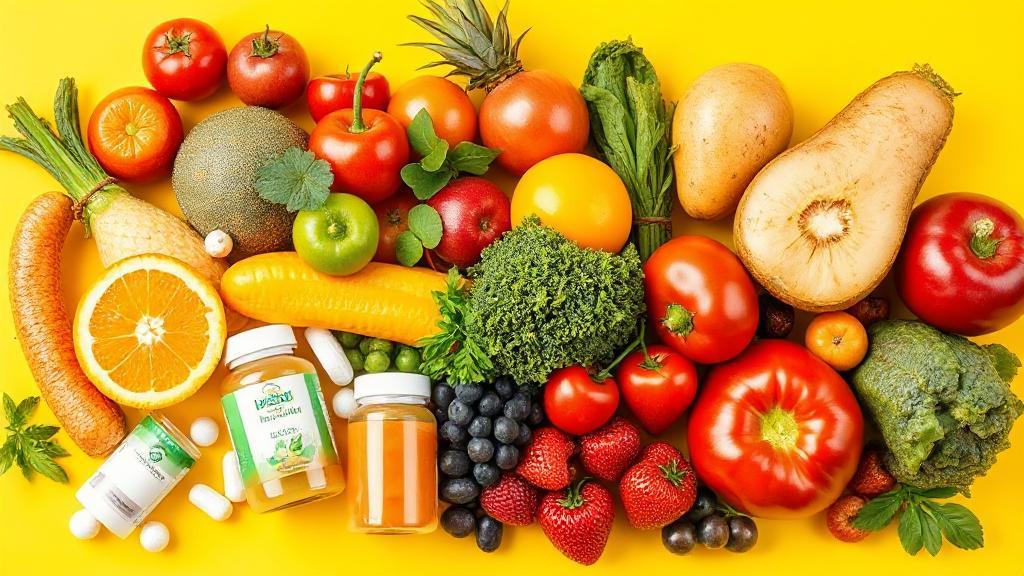Feeling sluggish or fatigued is a common experience, especially in today’s fast-paced world. While factors like sleep, hydration, and stress management are foundational for maintaining energy, certain vitamins and nutrients play a crucial role in supporting your body’s natural vitality. Let’s explore the top vitamins that can help boost your energy levels naturally, how they work, and how to ensure you’re getting enough through your diet and lifestyle.
Why Vitamins Matter for Energy
Vitamins are essential micronutrients that your body needs to function optimally. Many are directly involved in the metabolic processes that convert food into usable energy. Deficiencies can lead to tiredness, weakness, and even chronic fatigue. For a deeper dive into how vitamin deficiencies can affect your well-being, see Common signs and symptoms of vitamin D deficiency.
The B Vitamin Complex: Your Energy Powerhouses
The B vitamins are a group of eight essential nutrients that work together to support a wide range of bodily functions, most notably energy production. They are water-soluble, so regular intake through diet is crucial.
Vitamin B12 (Cobalamin)
- Role in Energy: Vital for red blood cell formation, neurological function, and DNA synthesis. Helps convert carbohydrates into glucose for energy.
- Sources: Meat, fish, poultry, eggs, dairy, fortified cereals, and plant-based milks.
- Deficiency Signs: Fatigue, weakness, anemia, cognitive issues.
- NIH Vitamin B12 Fact Sheet
Vitamin B6 (Pyridoxine)
- Role in Energy: Involved in over 100 enzyme reactions, primarily related to protein metabolism. Supports neurotransmitter production, affecting mood and energy.
- Sources: Poultry, fish, potatoes, bananas, chickpeas, fortified cereals.
- NIH Vitamin B6 Fact Sheet
Folate (Vitamin B9)
- Role in Energy: Works with B12 to make red blood cells and support iron function. Essential for DNA synthesis and repair.
- Sources: Leafy greens, asparagus, beans, avocado, fortified grains.
- NIH Folate Fact Sheet
Other Key B Vitamins
- Thiamine (B1): Converts carbohydrates into energy. Found in whole grains, beans, nuts, pork.
- Riboflavin (B2): Breaks down proteins, fats, and carbohydrates. Found in dairy, eggs, green veggies.
- Niacin (B3): Converts food into glucose. Found in chicken, tuna, lentils, peanuts.
- Pantothenic Acid (B5): Essential for fatty acid synthesis. Found in avocados, mushrooms, sweet potatoes.
Vitamin C: The Antioxidant Energizer
- Role in Energy: Supports iron absorption (crucial for oxygen transport), reduces fatigue, and helps synthesize carnitine for fat metabolism.
- Sources: Citrus fruits, strawberries, bell peppers, broccoli, spinach.
- NIH Vitamin C Fact Sheet
For more on how vitamin C supports your immune system, see Effective ways to boost your immune system naturally.
Vitamin D: The Sunshine Vitamin’s Link to Vigor
- Role in Energy: Regulates mood, supports muscle function, and is linked to reduced fatigue when levels are adequate.
- Sources: Sunlight exposure, fatty fish, egg yolks, fortified foods.
- NIH Vitamin D Fact Sheet
If you’re curious about the symptoms of deficiency, read Common signs and symptoms of vitamin D deficiency.
Iron: Oxygen Delivery System
- Role in Energy: Essential for producing hemoglobin, which transports oxygen to tissues. Iron deficiency is a leading cause of fatigue, especially in women.
- Sources: Red meat, organ meats, spinach, beans, lentils, fortified cereals.
- NIH Iron Fact Sheet
Vitamin C enhances iron absorption, so pairing these nutrients is beneficial.
Magnesium: The Relaxation Mineral
- Role in Energy: Activates ATP (the body’s energy currency) and is involved in over 300 enzymatic reactions.
- Sources: Dark leafy greens, nuts, seeds, whole grains, dark chocolate.
- NIH Magnesium Fact Sheet
Coenzyme Q10 (CoQ10): The Cellular Spark Plug
- Role in Energy: Not technically a vitamin, but vital for ATP production in mitochondria. Levels decline with age.
- Sources: Organ meats, fatty fish, whole grains, spinach, broccoli.
- Mayo Clinic CoQ10 Overview
Quick Reference Table: Energy-Boosting Nutrients
Holistic Strategies for Sustained Energy
Vitamins are just one piece of the energy puzzle. For optimal vitality, consider these additional strategies:
- Stay hydrated: Dehydration can sap energy. Learn how much water you need at How much water you should drink each day: daily hydration guidelines explained.
- Prioritize sleep: Quality rest is essential. Explore Effective strategies to improve your sleep quality.
- Manage stress: Chronic stress drains energy. Try these Effective ways to relieve stress quickly.
- Eat a balanced diet: Focus on whole, unprocessed foods for a variety of nutrients.
- Exercise regularly: Physical activity boosts energy in the long run.
- Support gut health: A healthy gut aids nutrient absorption. See Top probiotics for improving gut health.
- Take breaks and rest: Learn to recharge with How to make the most of doing nothing for relaxation and mental health.
When to Seek Medical Advice
Persistent fatigue despite a healthy diet and lifestyle may indicate an underlying health condition. Consult a healthcare provider if you experience:
- Severe fatigue interfering with daily activities
- Fatigue with other symptoms like weight loss or fever
- No improvement after addressing nutritional and lifestyle factors
Final Thoughts
Fueling your body with the right vitamins is a cornerstone of maintaining natural energy levels. By focusing on a diverse diet rich in fruits, vegetables, lean proteins, and whole grains, and by supporting your lifestyle with good sleep, hydration, and stress management, you can help your body maintain consistent vitality throughout the day.
For more on natural ways to support your health, check out Natural ways to lower blood pressure without medication and Top health benefits of drinking lemon water daily.
Always consult with a healthcare professional before making significant changes to your diet or starting new supplements.
